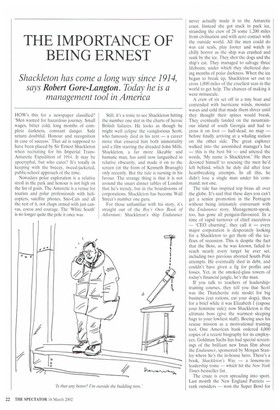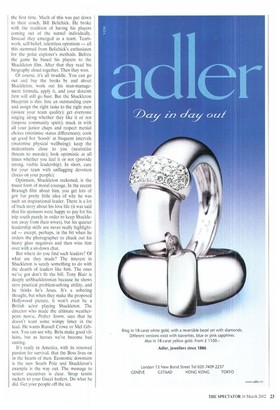THE IMPORTANCE OF BEING ERNEST
Shackleton has come a long way since 1914, says Robert Gore-Langton. Today he is a
management tool in America
HOW's this for a newspaper classified? 'Men wanted for hazardous journey. Small wages, bitter cold, long months of complete darkness, constant danger. Safe return doubtful. Honour and recognition in case of success.' That ad is supposed to have been placed by Sir Ernest Shackleton when recruiting for his Imperial TransAntarctic Expedition of 1914. It may be apocryphal, but who cares? It's totally in keeping with the breezy, tweed-jacketed, public-school approach of the time.
Nowadays polar exploration is a relative stroll in the park and honour is not high on the list of goals. The Antarctic is a venue for tourists and polar professionals with helicopters, satellite phones. Sno-Cats and all the rest of it, not chaps armed with just canvas, cocoa and courage. The 'White South' is no longer quite the pole it once was. Still, it's a tonic to see Shackleton hitting the number one slot in the charts of heroic British failures. He looks as though he might well eclipse the vainglorious Scott, who famously died in his tent — a career move that ensured him both immortality and a film starring the dreaded John Mills. Shackleton, a far more likeable and humane man, has until now languished in relative obscurity, and made it on to the screen (in the form of Kenneth Branagh) only recently. But the tide is turning in his favour. The strange thing is that it is not around the smart dinner tables of London that he's trendy, but in the boardrooms of corporations. Shackleton has become Wall Street's number one guru.
For those unfamiliar with his story, it's straight out of the Boy's Own Book of Adventure. Shackleton's ship Endurance never actually made it to the Antarctic coast. Instead she got stuck in pack ice, stranding the crew of 28 some 1,200 miles from civilisation and with zero contact with the outside world. All the men could do was eat seals, play footer and watch in chilly horror as the ship was crushed and sunk by the ice. They shot the dogs and the ship's cat. They managed to salvage three lifeboats, under which they sheltered during months of polar darkness. When the ice began to break up, Shackleton set out to cross 1,000 miles of the cruellest seas in the world to get help. The chances of making it were minuscule.
A crew of six set off in a tiny boat and contended with hurricane winds, monster waves and cold that made them shiver until they thought their spines would break. They eventually landed on the mountainous island of south Georgia and had to cross it on foot — half-dead, no map — before finally arriving at a whaling station on the other side. The great explorer walked into the astonished manager's hut — this is the best bit — and uttered the words, 'My name is Shackleton.' He then devoted himself to rescuing the men he'd left behind, which he duly did after four heartbreaking attempts. In all this, he didn't lose a single man under his command; not one.
The tale has inspired top brass all over the globe. It's said that these days you can't get a senior promotion in the Pentagon without being intimately conversant with the Endurance story. Management-speak, too, has gone all penguin-flavoured. In a time of rapid turnover of chief executives — 'CEO churning', they call it — every major corporation is desperately looking for a Shackleton to get them off the icefloes of recession. This is despite the fact that the Boss, as he was known, failed to reach nearly every target he ever set, including two previous aborted South Pole attempts. He eventually died in debt, and couldn't have given a fig for profits and losses. Yet, in the smoked-glass towers of today's financial jungle, he's the man.
If you talk to teachers of leadershiptraining courses, they tell you that Scott was the Thatcherite role model for big business (cut rations, eat your dogs), then for a brief while it was Elizabeth I (expose your feminine side); now Shackleton is the ultimate boss (give the warmest sleeping bags to your lowliest staff). Boeing uses his rescue mission as a motivational training tool. One American bank ordered 4,000 copies of a recent biography for its employees. Goldman Sachs has had special screenings of the brilliant new Imax film about the Endurance, sponsored by Morgan Stanley where he's the in-house hero. There's a book, Shackleton's Way — a lessons-in leadership tome which hit the New York Times bestseller list.
The craze is even spreading into sport. Last month the New England Patriots — rank outsiders — won the Super Bowl for the first time. Much of this was put down to their coach, Bill Belichick. He broke with the tradition of having his players corning out of the tunnel individually. Instead they emerged as a team. Teamwork, self-belief, relentless optimism — all this stemmed from Belichick's enthusiasm for the polar explorer's methods. Before the game he bused his players to the Shackleton film. After that they read his biography aloud together. Then they won.
Of course, it's all twaddle. You can go out and buy the books by and about Shackleton, work out his man-management formula, apply it, and your dotcom firm will still go bust. But the Shackleton blueprint is this: hire an outstanding crew and assign the right tasks to the right men (assure your team quality); get everyone singing along whether they like it or not (impose community spirit); muck in with all your junior chaps and respect menial chores (minimise status differences); cook up good hot `hoosh' at frequent intervals (maximise physical wellbeing); keep the malcontents close to you (neutralise threats to morale); look optimistic at all times whether you feel it or not (provide strong, visible leadership). In short, care for your team with unflagging devotion (focus on your people).
Optimism, Shackleton reckoned, is the truest form of moral courage. In the recent Branagh film about him, you get lots of grit but pretty little idea of why he was such an inspirational leader. There is a lot of back story about his love life (it was said that his sponsors were happy to pay for his trip south purely in order to keep Shackleton away from their wives), but his quieter leadership skills are never really highlighted — except, perhaps, in the bit when he orders the photographer to chuck out his heavy glass negatives and then wins him over with a sit-down chat.
But where do you find such leaders? Of what are they made? The interest in Shackleton is surely something to do with the dearth of leaders like him. The ones we've got don't fit the bill. Tony Blair is deeply unShackletonian because he shows zero practical problem-solving ability, and he thinks he's Jesus. It's a sobering thought, but when they make the proposed Hollywood picture, it won't even be a British actor playing Shackleton. The director who made the ultimate weatherporn movie. Perfect Storm, says that he doesn't want some wimpy limey in the lead. He wants Russell Crowe or Mel Gibson. You can see why. Brits make good villains, but as heroes we've become bad casting.
It's really in America, with its renewed passion for survival, that the Boss lives on in the hearts of men, Economic downturn is the new South Pole and Shackleton's example is the way out. The message to senior executives is clear. Strap tennis rackets to your Gucci loafers. Do what he did. Get your people off the ice.

















































































 Previous page
Previous page